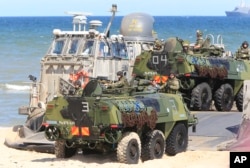Recent events in Eastern Europe and rising tensions with Russia have revived the debate over NATO enlargement, which Moscow considers a provocation. The question comes as NATO leaders prepare to hold a summit early next month in Warsaw, Poland.
With Montenegro having begun the accession process to join NATO, the question over the Alliance's future enlargement is once again looming large for countries in the Balkans and elsewhere.
For Macedonia, at NATO's doorstep, becoming a NATO member is the only alternative - says Zoran Jolevski, the country's defense minister.
“The more NATO is in southeast Europe, in the Balkans, the more prosperous and stable the Balkans is,” he said.
Beyond the enlargement issue, the deployment of NATO forces in the Baltic states, Poland and Romania will be the main focus at the upcoming Warsaw summit. Such a deployment is significant, says executive director of the McCain Institute and former U.S. ambassador to NATO, Kurt Volker.
“It is a signal to anyone, including Russia, that NATO is prepared to defend its members," he said. "That is very, very important. That’s the heart of deterrence that is showing that willingness to take those steps, that’s critical…even with reducing defense budgets and reducing U.S. commitment overall, this step is very important.”
But NATO's move to station forces on its eastern flank and its membership enlargement are considered threats by Russian leader Vladimir Putin.
“His goal is to get NATO to back down. He wants to divide Europe, divide NATO, force NATO to back down, not protect the member states of NATO that are adjacent to Russia," Volker said. "It is very important that NATO not accept that. “
Russia has responded to NATO’s focus on its eastern flank with a pledge to deploy three divisions – numbering some 30,000 troops – to its western and southern flanks by the end of this year.






